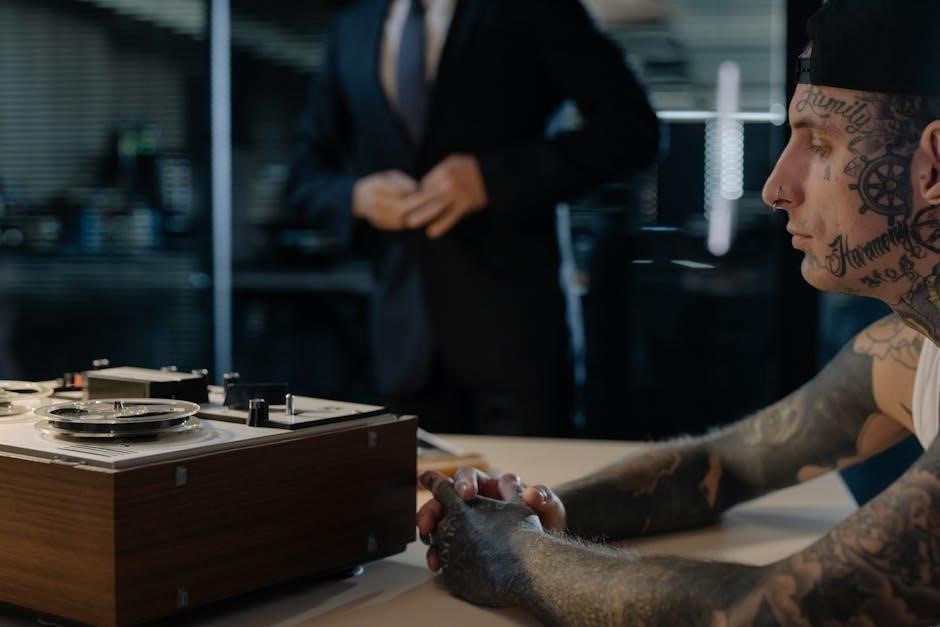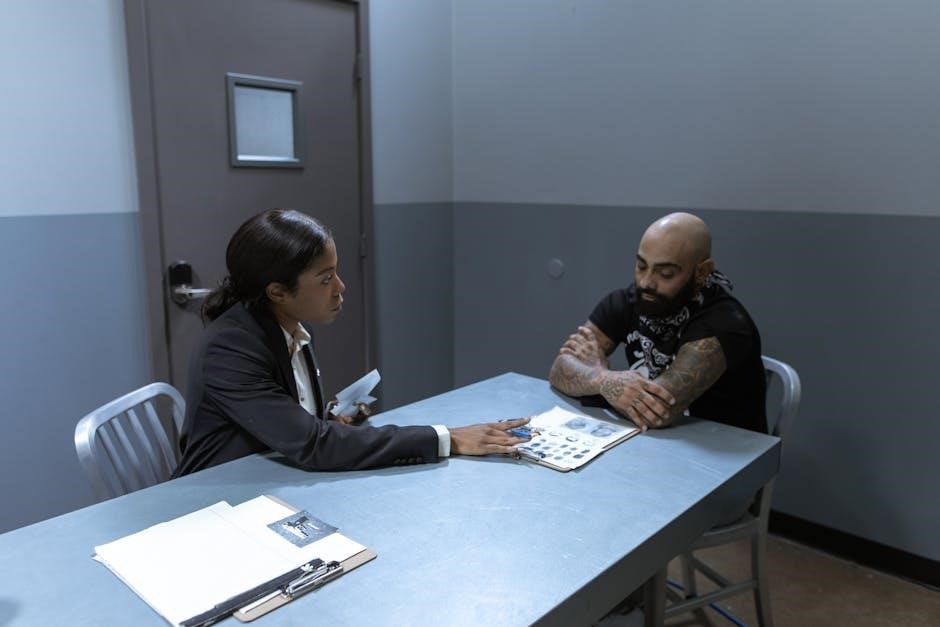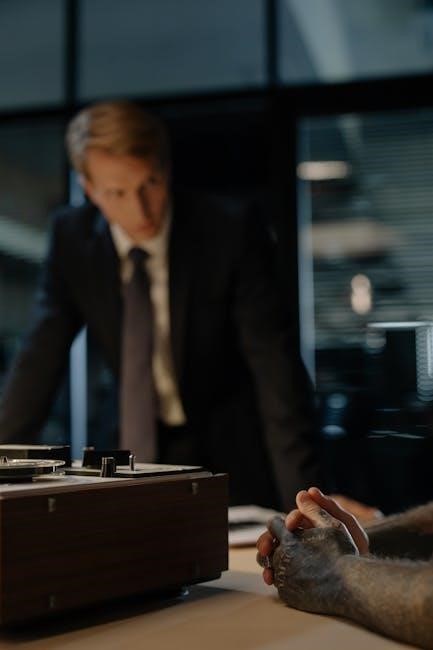
Firefighter interviews assess candidates’ emotional, mental, and physical preparedness for the role․ They focus on experience, decision-making, and teamwork, ensuring candidates align with departmental values and community needs․
Overview of Common Topics Covered
Firefighter interviews typically cover a range of topics, including motivation for joining the profession, relevant experience, and key qualities like bravery, teamwork, and physical fitness․ Questions also focus on technical knowledge, such as fire suppression systems, extinguisher usage, and fire behavior․ Scenario-based queries assess decision-making in emergencies, while others evaluate communication skills and adaptability under pressure․ Candidates are often asked about their understanding of safety protocols and how they handle high-stress situations․ Additionally, questions may explore their familiarity with fire department operations and their ability to work collaboratively in dynamic environments․ Preparation is crucial to address these areas effectively․

Importance of Preparation
Preparation is vital for a firefighter interview as it demonstrates professionalism and readiness․ Researching the department and practicing answers to common questions ensures confidence and clarity․ Reviewing technical knowledge, such as fire suppression systems and safety protocols, is essential․ Understanding the department’s culture and values allows candidates to align their responses․ Practicing scenario-based questions helps in showcasing decision-making skills․ Physical and mental readiness, along with understanding the challenges of the role, highlights commitment․ Preparation not only improves performance but also reflects a candidate’s dedication to the demanding responsibilities of firefighting, increasing their chances of standing out in a competitive process․

General Firefighter Interview Questions
General firefighter questions focus on motivation, experience, and key qualities, assessing suitability for the role and alignment with department values․
Why Do You Want to Be a Firefighter?
Answering this question requires showcasing your passion for serving the community and desire to make a difference․ Highlight personal experiences, such as witnessing a rescue, that inspired your interest․ Emphasize admiration for firefighters’ bravery and the fulfillment gained from helping others in crisis․ Connect your motivation to the role’s challenges and the opportunity to contribute to public safety․ Avoid generic responses like “I think it’s cool,” and instead focus on your alignment with the fire department’s mission and values․ Demonstrating a genuine understanding of the role’s demands and your commitment to the community will strengthen your answer․
Discuss Your Relevant Experience
When discussing your relevant experience, focus on specific roles and skills that align with firefighting․ Highlight certifications like NEBOSH or OSHA, demonstrating expertise in fire safety․ Share examples of leadership, teamwork, and problem-solving from previous jobs or volunteer work․ Mention any experience with emergency response, equipment operation, or physical training; Quantify achievements, such as completing a challenging training program or contributing to a successful community safety initiative․ Emphasize how your background prepares you for the physical and mental demands of firefighting․ Show a clear connection between your past experiences and the skills required to excel as a firefighter․
Key Qualities of a Successful Firefighter
A successful firefighter must possess a unique blend of physical stamina, mental resilience, and strong moral character․ Key qualities include leadership, integrity, and adaptability to thrive in high-pressure situations․ Firefighters must demonstrate teamwork, as they rely on colleagues to ensure safety and efficiency․ Strong communication skills are essential for coordinating actions and providing clear instructions during emergencies․ Emotional stability is critical to remain calm and make sound decisions in life-threatening scenarios․ Additionally, a commitment to continuous learning and physical fitness is vital to stay proficient in evolving safety protocols and equipment․ These qualities ensure firefighters can protect communities effectively while maintaining trust and professionalism․
Technical Firefighter Interview Questions
These questions focus on fire suppression systems, extinguisher use, fire behavior, and safety protocols, testing practical knowledge and ability to apply technical skills in emergency scenarios effectively․
Fire Suppression Systems and Equipment
Fire suppression systems and equipment are critical in controlling and extinguishing fires․ Common systems include wet pipe, dry pipe, and pre-action systems, each designed for specific environments․ Fire extinguishers, classified by fire types (A, B, C, D, K), must be used correctly to ensure safety․ Understanding equipment like sprinklers, hoses, and nozzles is vital․ Candidates are often asked to explain how these systems operate, their maintenance requirements, and how to inspect them properly․ Proper use of equipment, such as the PASS method for extinguishers, demonstrates practical knowledge․ Familiarity with NFPA standards and local regulations is also essential․ This expertise ensures effective fire suppression and safety in emergencies․
Proper Use of Fire Extinguishers
Fire extinguishers are essential tools for controlling small fires․ The PASS method is a critical technique: Pull the safety pin, Aim the nozzle at the base of the fire, Squeeze the handle to release the extinguishing agent, and Sweep the nozzle from side to side, covering the entire area of the fire․ Understanding the types of extinguishers (A, B, C, D, K) and their uses is vital․ For example, water extinguishers are effective for Class A fires (paper, wood), while CO2 extinguishers are better for Class B (flammable liquids)․ Always inspect extinguishers monthly and ensure they are easily accessible․ Proper use can prevent fires from escalating and save lives․
Understanding Fire Behavior and Safety Protocols
Understanding fire behavior is critical for firefighters to predict and combat fires effectively․ This involves knowledge of the fire triangle (fuel, oxygen, heat), stages of fire development, and how fires spread․ Safety protocols are essential to protect firefighters and civilians․ These include wearing personal protective equipment (PPE), maintaining clear communication during emergencies, and following evacuation procedures․ Firefighters must also adhere to incident command systems and safety guidelines to minimize risks․ Proper training in fire behavior and protocols ensures coordinated and safe operations, preventing accidents and enhancing overall fire response effectiveness․

Scenario-Based Firefighter Interview Questions
Scenario-based questions assess how candidates handle emergency situations, testing decision-making, teamwork, and critical thinking under pressure to ensure they can manage high-stress environments effectively․
Decision-Making in Emergency Situations
Decision-making in emergency situations is critical for firefighters, as it directly impacts outcomes․ Common questions include: “How would you prioritize tasks during a multi-alarm fire?” or “What would you do if a civilian is trapped inside a burning building?” Interviewers assess the ability to think logically under pressure and make quick, informed decisions․ Candidates are expected to demonstrate calmness, situational awareness, and adherence to safety protocols․
Examples of answers should highlight clear reasoning, prioritization of safety, and effective communication․ The goal is to showcase the ability to remain composed and make sound judgments in high-stress scenarios․
Teamwork and Communication in High-Pressure Environments
Teamwork and communication are essential for firefighters, as they often work in high-stress environments requiring seamless coordination․ Questions like, “Describe a situation where you had to work as part of a team to resolve an emergency,” or “How would you communicate with your crew during a chaotic incident?” are common․ Interviewers seek candidates who can collaborate effectively, maintain clear communication, and remain calm under pressure․
Strong answers should highlight specific examples of teamwork, clear communication strategies, and the ability to adapt to dynamic situations while ensuring safety and efficiency․

Preparing for the Firefighter Interview
Research the department, practice common questions, and simulate interview scenarios․ Focus on showcasing your experience, skills, and passion for firefighting through clear, concise answers․

Researching the Fire Department
Researching the fire department is crucial for a successful interview․ Understanding their mission, values, and community programs allows you to align your answers with their priorities․ Review their website, annual reports, and recent news to gain insights into their specific needs and challenges․ This knowledge demonstrates your genuine interest and commitment to joining their team․ Familiarize yourself with their unique initiatives, such as fire prevention programs or outreach activities, to showcase how your skills and experiences align with their goals․ This preparation enables you to ask informed questions and highlight your suitability for their department․
Practicing Answers to Common Questions
Practicing answers to common firefighter interview questions is essential for confidence and clarity․ Use the STAR method (Situation, Task, Action, Result) to structure your responses, ensuring specificity and relevance․ Review frequently asked questions, such as “Why do you want to be a firefighter?” or “Describe your relevant experience,” and prepare thoughtful answers․ Practice aloud to refine your delivery and timing․ Focus on highlighting your skills, certifications, and experiences that align with the role․ Utilize practice booklets or guides to familiarize yourself with technical and scenario-based questions․ This preparation ensures you present yourself as a well-prepared and capable candidate․
Preparing for a firefighter interview requires dedication and thorough practice․ Research the department, review common questions, and practice your responses using the STAR method․ Stay positive, be honest, and showcase your passion for serving the community․ Highlight your certifications, physical fitness, and relevant experience․ Demonstrate clear communication and decision-making skills, especially in high-pressure scenarios․ Lastly, stay calm and confident during the interview, as your enthusiasm and readiness will leave a lasting impression․ Remember, preparation is key to standing out as a strong candidate for this critical and rewarding role․